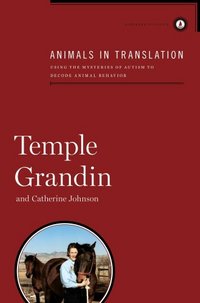

Purchase
Using The Mysteries Of Autism To Decode Animal Behavior
Scribner
February 2010
On Sale: February 2, 2010
368 pages
ISBN: 143918710X
EAN: 9781439187104
Hardcover
Add to Wish List
Non-Fiction
Temple Grandin's Animals in Translation speaks in the
clear voice of a woman who emerged from the other side of
autism, bringing with her an extraordinary message about how
animals think and feel. Temple's professional training as
an animal scientist and her history as a person with autism
have given her a perspective like that of no other expert in
the field. Standing at the intersection of autism and
animals, she offers unparalleled observations and
groundbreaking ideas about both. Autistic people can
often think the way animals think -- in fact, Grandin and
co-author Catherine Johnson see autism as a kind of way
station on the road from animals to humans -- putting
autistic people in the perfect position to translate "animal
talk." Temple is a faithful guide into their world,
exploring animal pain, fear, aggression, love, friendship,
communication, learning, and, yes, even animal genius. Not
only are animals much smarter than anyone ever imagined, in
some cases animals are out-and-out brilliant. The
sweep of Animals in Translation is immense, merging
an animal scientist's thirty years of study with her keen
perceptions as a person with autism -- Temple sees what
others cannot. Among its provocative ideas, the
book: - argues that
language is not a requirement for consciousness -- and that
animals do have consciousness
- applies
the autism theory of "hyper-specificity" to animals, showing
that animals and autistic people are so sensitive to detail
that they "can't see the forest for the trees" -- a talent
as well as a "deficit"
- explores the
"interpreter" in the normal human brain that filters out
detail, leaving people blind to much of the reality that
surrounds them -- a reality animals and autistic people see,
sometimes all too clearly
- explains how
animals have "superhuman" skills: animals have animal
genius
- compares animals to autistic
savants, declaring that animals may in fact be autistic
savants, with special forms of genius that normal people do
not possess and sometimes cannot even see
- examines how humans and animals use their
emotions to think, to decide, and even to predict the
future
- reveals the remarkable abilities
of handicapped people and animals
- maintains that the single worst thing you can
do to an animal is to make it feel
afraid
Temple Grandin is like no other
author on the subject of animals because of her training and
because of her autism: understanding animals is in her blood
and in her bones.
Comments
No comments posted.
Registered users may leave comments.
Log in or register now!
| 


 © 2003-2025 off-the-edge.net
all rights reserved Privacy Policy
© 2003-2025 off-the-edge.net
all rights reserved Privacy Policy